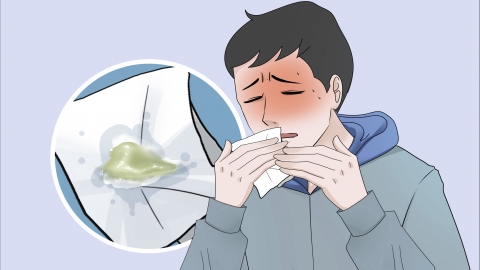What causes excessive phlegm in the throat?
Generally, excessive phlegm in the throat may be caused by factors such as dry air, dietary irritation, acute rhinitis, acute bronchitis, or chronic pharyngitis. It is recommended to seek timely medical consultation to identify the underlying cause and receive targeted treatment. Detailed analysis is as follows:

1. Dry air
When environmental humidity is low, moisture on the pharyngeal mucosa evaporates too quickly. Glands may secrete more mucus to protect the mucosa, resulting in increased phlegm. Using a humidifier to maintain proper air humidity and drinking 1500-2000ml of water daily can help alleviate mucosal dryness.
2. Dietary irritation
Consuming excessive spicy, sweet, or greasy foods within a short period may stimulate the throat and respiratory glands to secrete more mucus, leading to increased phlegm production. It is recommended to adjust the diet by reducing intake of these foods and increasing consumption of fresh fruits and vegetables such as pears and winter melon. Symptoms typically improve after one to two weeks of a light diet.
3. Acute rhinitis
When nasal mucosa becomes infected by viruses or bacteria, increased secretions may drain posteriorly into the throat through the nasopharynx, causing postnasal drip and resulting in increased phlegm. Nasal congestion and runny nose may also occur. Viral infections usually resolve spontaneously, while bacterial infections can be treated under a doctor's guidance with medications such as amoxicillin capsules or eucalyptus oil enteric-coated capsules to promote mucus expulsion.
4. Acute bronchitis
Inflammation of bronchial mucosa due to infection may cause mucosal congestion and edema, leading to increased mucus production that is coughed up into the throat. Patients may also experience sore throat. Treatment may include medications such as dextromethorphan hydrobromide tablets, ambroxol hydrochloride oral solution, or cefuroxime axetil granules, as directed by a physician.
5. Chronic pharyngitis
Long-term exposure to irritants such as dust, smoke, or alcohol, or repeated episodes of acute pharyngitis, may lead to chronic mucosal congestion, glandular hyperplasia, and increased production of thick secretions. Avoiding irritants and using medications such as cetidine iodine lozenges or budesonide suspension for inhalation under medical guidance may help alleviate symptoms.
Maintaining healthy lifestyle habits is important. Avoid consuming spicy and irritating foods such as pepper, chili peppers, and garlic, as these may hinder recovery.







